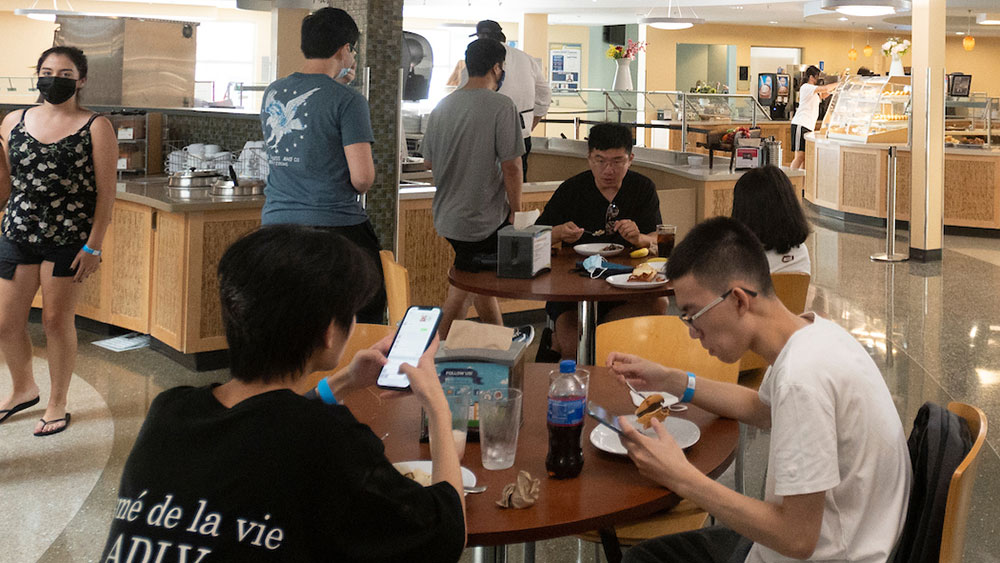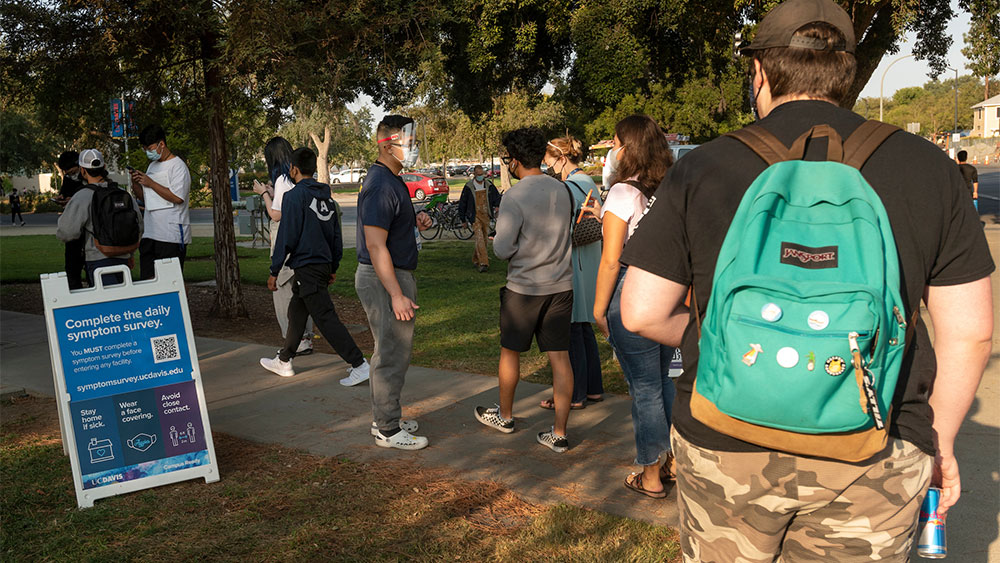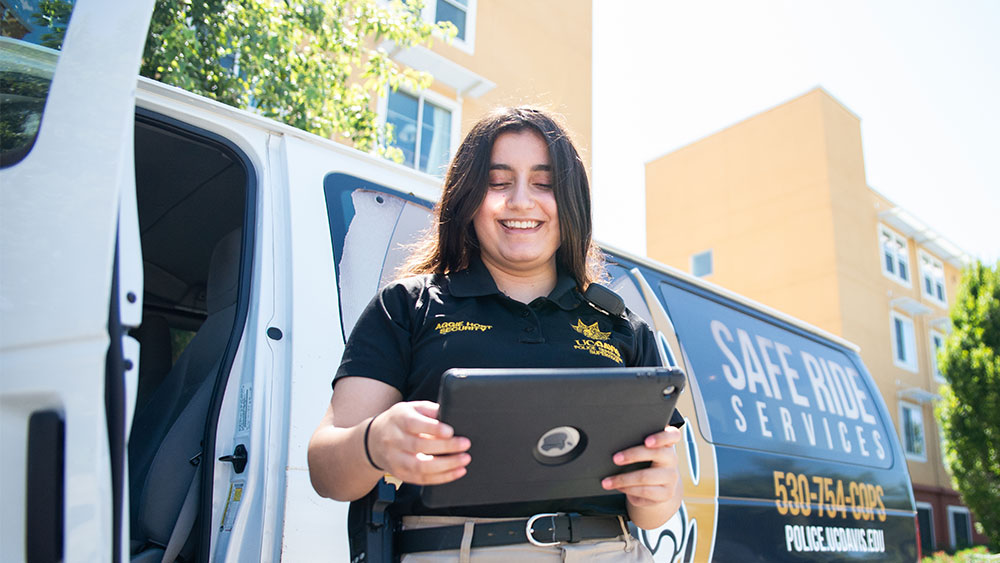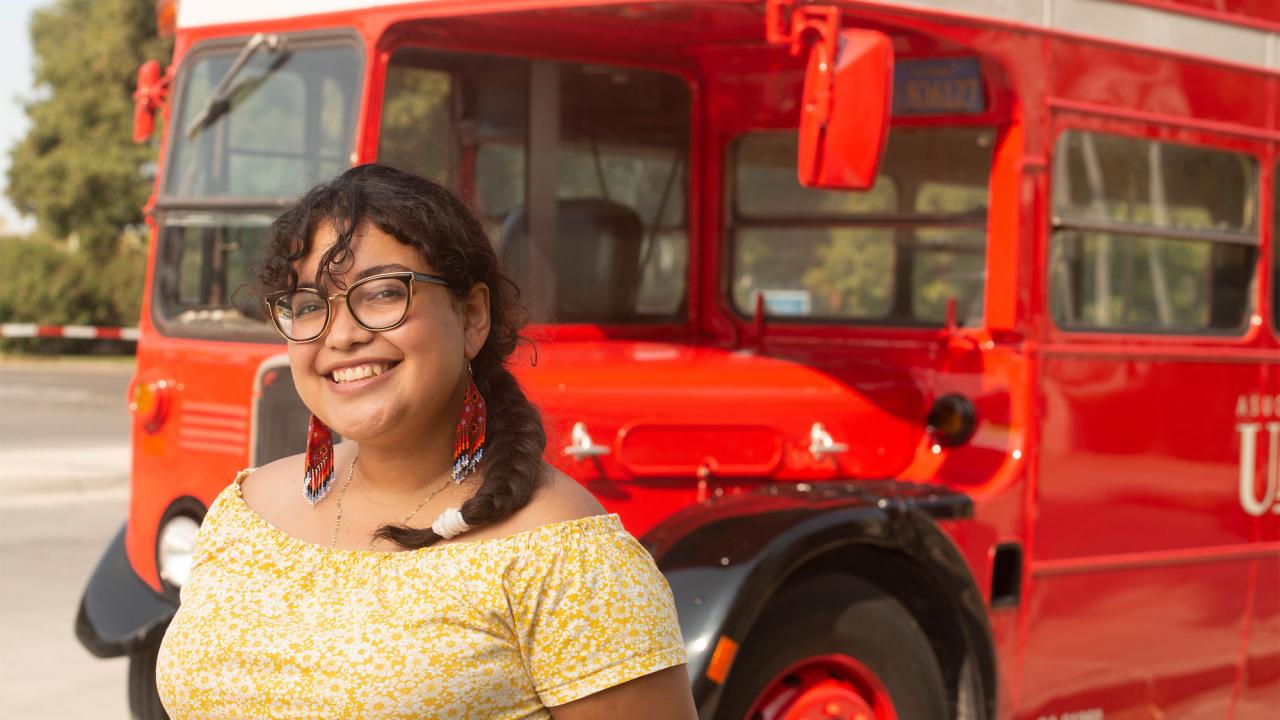In January 2020, Celia Murillo Amezcua started as a conductor for Unitrans’ double-decker buses. And then the pandemic led to remote instruction and bus service reductions. Last May, the senior became the human resources manager for the student-run bus service. And now she is among those challenged to recruit hundreds of students to part-time jobs still vacant three weeks after the start of the fall quarter and return to in-person instruction.
WAGES AND BENEFITS
For campus jobs, minimum wage is $14 an hour and goes up to $15 on Jan. 1. Unitrans trainers, supervisors and managers can earn more than $20 an hour. The Coffee House offers its student employees a 30 percent discount on food any time, and Dining Services students earn a meal credit for each shift.
Beyond the benefits of a part-time job discussed on the Internship and Career center website, campus jobs are conveniently located, are flexible to accommodate student schedules, provide a sense of belonging, and offer the opportunity to contribute to the community.
Of the asymptomatic COVID-19 testing program, Schorzman of Student Health and Counseling Services said: “Most of us work there because it’s one of the key reasons we were able to open in person. You’re participating in something really important for our campus community and helping keep us healthy.”
“It’s been a wild ride,” said Murillo Amezcua, who is majoring in electrical engineering. “We really can’t run the buses without drivers.”
Students power the campus. Beyond Unitrans, think of the Coffee House, or CoHo; residential dining; campus tours; Aggie Host security; Campus Recreation; Aggie Public Health Ambassadors; and asymptomatic COVID-19 testing. Having student jobs go unfilled has led to less frequent bus service, longer lines in dining commons, reduced days and hours of operation at the CoHo, and more.
But the campus is responding with creative efforts to attract applicants and streamline the process that gets those hired ready to work.
Prior to the pandemic, the campus and Associated Students of UC Davis, or ASUCD, employed 5,828 students in non-academic positions as of October 2019. As of last month, they had about 4,162 student employees on payroll; they need to hire about 1,500 more this fall, according to Cory Vu, associate vice chancellor for Health, Wellness and Divisional Resources in Student Affairs. “We’re so dependent on student employees,” he said. “It’s important all of these positions be filled so students using these services are looked after.”
Even as the university planned for months to resume in-person instruction and services, student hiring efforts have been hampered by the fact that instruction had been remote since March 2020. Services that had reduced or suspended operations lost student employees. Students weren’t on campus for the spring hiring season or training in the spring and summer. And as hiring does happen in a shorter time period this fall, units are experiencing long waits for the Shared Services Organization to complete the onboarding process.
“We’re asking patience and kindness from the campus as we ramp up,” Vu said. “Everyone’s working extremely hard.”
Situation not unique to UC Davis
Why are we here? Was the campus out of sight, out of mind for students? As Vu of Student Affairs wonders, were students waiting to see how prevalent COVID-19 was on campus? Is it enough — even without a job — to try to navigate a return to in-person classes during the pandemic?
Budget and Institutional Analysis will be exploring the issue to see if there are any notable differences in the student employee population across years.
What we do know is that the problem is not unique to UC Davis. The Chronicle of Higher Education explored how a shortage of student workers has contributed to struggles providing campus services in the Oct. 4 article “Higher Ed’s Rocky Reboot: Stretched supply chains and short-staffed campuses have left students hungry and parents angry.” In a Sept. 10 article, Food Management reported how the shortfall of full-time and student workers has forced numerous campus dining programs to curtail operating hours, limit menus and even shut down. And the need for bus drivers has led school districts and public transit systems across the country, including Yolobus, to reduce services.
New efforts to attract applicants
The Internship and Career Center, or ICC, held virtual job fairs in July, August and last Thursday (Oct. 7). Student Affairs is offering an incentive for its student employees to encourage friends to apply for jobs; if the applicant is hired and works a certain minimum number of hours, the referring employee gets a $50 gift card.
Most units increased their marketing for student recruits. Murillo Amezcua of Unitrans said she uses any opportunity she can to recruit employees — even her platform as student director of the UC Davis Marching Band. “It’s a really cool thing to be able to drive a bus in college, especially the double-deckers,” she said.
Marcie Kirk Holland, executive director of the ICC, said Handshake, the job listing and search platform for campus, should be a first destination for campus employers and student job seekers. One of the reasons: The campus is now sending applicants not hired for one job suggestions for other openings.
Getting new hires on board
A project to improve the student employee experience is helping expedite hiring this fall even as it looks at long-term solutions. The collaboration of Student Affairs and the Shared Services Organization, or SSO, came about after the transition to UCPath for personnel transactions led, in fall 2019, to backlogs onboarding student employees and paying them.
The necessary processes — and queuing for many student hires at a time — can still add two to even five weeks to the wait for units to put a student to work.
In a new move, Vu said, processing of student hires for jobs requiring background checks is being temporarily allowed to go forward on a provisional basis until the checks can be made. Group onboarding sessions have also been expanded to accommodate more students.
Overall, the project aims to decrease the time it takes to bring a new student on board and improve communication with hiring managers and students throughout the process.
“There are opportunities to improve the hiring experience from end to end,” said Jim Hankins, executive director of the SSO.
Training, too, takes time
Unitrans, operated by ASUCD, shows why some units that usually recruit in the spring or summer will need even longer to get student employees in place. It takes 150 hours of instruction and behind-the-wheel training to prepare a student driver. Campus jobs pay for hours spent in required training, but this summer Unitrans sweetened the pot: It offered free student housing as well as meals on training days. There were just 15 takers.
Jeff Flynn, general manager of Unitrans, said the bus service is running at two-thirds capacity with just 105 of its usual 175 drivers and another 30 still in training. A September announcement outlined reductions in services and indicated some may last through the academic year.
Unitrans drivers usually start at $17.25 an hour, but in a special retention initiative, all drivers are now being paid $18.75.
Thought for food

Darin Schlep, food service director for ASUCD, knew reopening the CoHo would be tough. It usually operates with about 450 student employees, and it was clear the numbers would fall short. Even now, there are only about 175.
“We went into it purposefully saying we’d build an operating model based on the staffing we’d have,” he said.
To reduce training time, students employees were assigned to work at two instead of all six platforms, or eateries. Later, the management team decided to have only three platforms — and only one of its two satellite locations — open, all with shortened service hours.
Last week, the CoHo discontinued Friday service. “In discussions with the Coffee House management team and student leaders,” Schluep said, “it was clear that, with our current staffing challenges, a five-day operating schedule was not sustainable.” Staff have been rescheduled Monday through Thursday.
Despite the long lines for service, Schluep said most customers have been understanding. “I’ve been very heartened by their response,” he said.
Dining Services — which looks after residential dining, most retail operations and catering — still needs to hire 100 of its 600 food service and culinary staff members and 150 of about 800 student employees.
“We found once students got back to school, our application numbers started increasing,” said Ramona Hernandez, director of business and financial services for Student Housing and Dining Services.
She said priority was put on filling positions in residential dining, and now the biggest need is in retail operations. Still closed are The Gunrock, Silo Market, Latitude Market, King Hall Coffee and California Coffee.
Administrative support helps

Campus Recreation and the asymptomatic testing operation at the ARC are both using new administrative positions to support student hiring.
Operating seven days a week and seeing 4,000 or more students and employees on a weekday, the testing program at the ARC needs to hire additional students and temporary workers for the equivalent of 20 full-time positions.
Cindy Schorzman, medical director of Student Health and Counseling Services, said a scheduler who started two weeks ago is enabling the center to now offer greater flexibility in scheduling and shorter shifts that students should find appealing.
In July, Campus Recreation hired an administrative assistant not only to process student fee waivers for recreational programs but also to be the internal hub for student hiring and verifying training requirements and certifications.
Except for openings for advanced horseback riding instructors, Campus Rec has been successful in hiring its student work force of about 600. But the pandemic set it behind in training students to teach group exercise classes; some won’t be ready until winter quarter.
Security for major events

Manager Ernesto Moron hasn’t been able to field the usual numbers of Aggie Hosts to work security for home football games. Usually, he schedules 45. But that’s all the student employees he has right now — to work major events, patrol buildings and provide Safe Ride Services. For a recent game, he added protective service officers, also a unit of the UC Davis Police Department, and contracted for three private security officers.
As he looks ahead to the Causeway Classic football game Nov. 20 and at least four commencement ceremonies in December, Moron is doing what he can to hire and train a full complement of about 75 Aggie Hosts. He has participated in the job fairs and other student events. “It’s been helping a lot for people to know what we do,” he said. Six students are working their way through onboarding and training.
For tours, one foot behind the other
“I knew every other department would be looking for student employees,” Jessica Acuna said.
But for the manager of the campus tour program, that’s not the hard part. It’s encouraging students — so many more of them new to campus this quarter — to apply as tour guides and then learn so much about the campus.
Acuna has about 20 returning guides and hired about 25 more in January. But with a need for twice as many, she’s had to adopt a more compressed timeline for hiring and training in the fall to prepare them for the busiest season of in-person tours in the spring.
Acuna is working with a student leadership team of eight to recruit, interview and then train more guides.
She’s also challenged to nurture the guides’ esprit de corps — something that has been made more difficult by a rather quiet campus and the suspension of in-person tours until this August.
“The whole point of this position is to connect with prospective students and share their stories,” Acuna said. “They need that.
“Thankfully, I do have returners. I don’t think I could do it without my students.”
